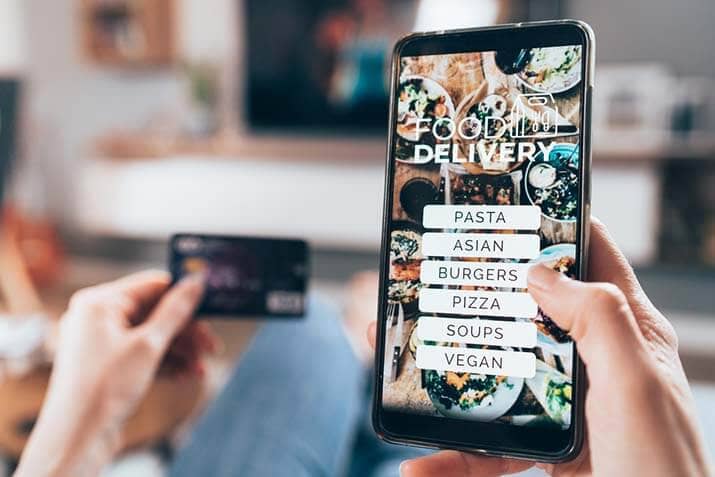Delivery
10 Marketing Tips for Delivery and Takeout Programs
Sep 27, 2020

One of the biggest considerations when deciding how to offer off-premise dining is how it will impact your marketing approach. Whether you opt to partner with third-party delivery companies or handle it yourself (more on that here), you’ll have to decide how much control of the customer relationship you’re willing to give up for the potential visibility that third-party apps offer.
Whatever your choice, here are some ways to get the word out about your off-premise program:
1. Website
Simply adding a button to your website and social media pages that says you now do delivery or takeout is the best way to let people know you’re now offering it. You can also add a pop-up window to let folks know your new delivery options so they can’t miss it, like they do at Reem's California in Oakland, CA.
2. Social Media
Many of the apps and platforms provide marketing materials to restaurants to help promote via social media. For example: UberEats has an eBook about how to properly co-brand things for use on social media and ChowNow has created Facebook and Instagram integrations so you can add buttons that direct followers to your online ordering platform. Your social media followers are already engaged enough in your brand to follow you, so make sure they know about your off-premise service.
3. Targeted social media advertising
Using the data and targeting capabilities of social media ads can help you target new customers (by geography, interests and other characteristics) that will be predisposed to your brand. Chef Eric Rivera, the owner of Addo Restaurant in Seattle, has built a highly adaptable and diverse operation over the last several years. When the pandemic started, they were able to shift their business model on the fly to some really unique at-home experiences without using any of the big third-party apps. Marketing to new customers using social media and targeted ads has been a big part of their success since the pandemic started, as he shares in this Twitter thread: “For our ads, we push through Facebook and Instagram mostly...I’m not a fan of Facebook or Instagram but the advertising component is massive for us and frankly, we would be closed without it.”1 They’ve implemented a lot of different technology and Rivera has always used the data and analytics from the various social media channels to help guide different ideas. This is a great example of how the online customer experience can be harnessed.
4. Combine in-house and third-party delivery
If you decide to handle deliveries yourself, you can still use bigger third-party apps as an additional online ordering platform, more for awareness than anything else. Have all your other digital marketing point to your proprietary app or website ordering system.
5. Paid marketing through third-party apps
All of the third-party apps offer some form of paid marketing promos. For example: “First order, $0 Delivery fee” from DoorDash or Grubhub’s “$10 Off $30.” These help with new customer acquisition and you can easily track the popularity of these promotions on their merchant portals. Keep in mind they charge for you these campaigns, either a flat fee per order or a commission.
6. Search optimization
Make sure you have up-to-date, detailed information on various search tools such as Yelp!, Tripadvisor, and Google Business Listings. This will help people find you when they search for restaurants near them.
7. Ratings and reviews
Keep track of reviews such as Yelp!, Tripadvisor and Google. Unlike many of the third-party delivery apps, you can use these platforms to reach out directly to customers and interact with them based on their experiences.
8. Email
If you customers have opted-in to receiving emails from you, use it to communicate specials and new items, but limit your frequency to once per week to keep it newsworthy.
9. Shoot proper food photos
According to the food delivery apps, having a great food photo increases sales by 30%. Some of the third-party apps provide a free photographer to take food photos. But if you decide to do it yourself, you don’t need an expensive camera—a smartphone will work just fine.
10. Focus on customer retention
As important as it is to drive in new customers, don’t forget your regulars. On average, returning customers spend twice as much as new customers, so it’s worth nurturing these relationships with special offers and communications.2 Consider adding a coupon in the bag for a discount on their next delivery order, and a personal note thanking them for their business. Make them feel appreciated!
Use Marketing to Best Serve Your Customers
A focus on marketing can be greatly beneficial to your business by helping you generate more orders, but it also provides tools for you to best serve your customers. Don’t be afraid to get creative with the different marketing tools and campaigns you may run. By providing an exceptional experience through your marketing and digital interactions, you can ensure you build a loyal customer base that becomes your delivery and takeout regulars.
1 https://twitter.com/ericriveracooks/status/1282506800646901761?s=20
2 http://rejoiner.com/resources/how-to-convert-an-existing-customer-into-a-repeat-customer/


